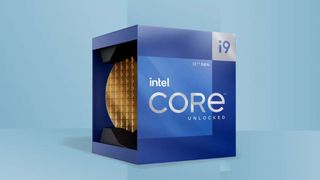Intel Raptor Lake flagship CPU leaked gaming benchmarks are causing some concern
But we shouldn’t jump to conclusions about the Core i9-13900K

Intel’s Raptor Lake flagship CPU has seen some further leaked benchmarks, and unlike the previous spillage, this is a juicier affair because they’re actual gaming tests.
The game benchmarks come from the same source on Chinese video sharing website Bilibili who provided results for the likes of CineBench and Geekbench recently, as flagged up by @harukaze5719 on Twitter.
i9 12900K vs i9 13900K gaming comparison. (relative)*NOTE : some high perf is due to radical perf improve in some games https://t.co/IC9tvXupeo pic.twitter.com/B8GEW9TVIrJuly 17, 2022
Again, this is an engineering sample of the Core i9-13900K processor which is compared to its predecessor the 12900K, but we have to bear firmly in mind that it’s a pre-release chip, and also be very cautious about any leaked benchmarking, anyway.
Bearing those caveats in mind, across a selection of games including some popular titles like Red Dead Redemption 2, Horizon Zero Dawn and PUBG, the 13900K turned out to be about 5% faster for average frame rates at 1080p resolution, around 7% quicker at 1440p, and 3% better at 4K resolution.
The rough upshot of this is around a 5% increase for gaming performance compared to the 12900K, which feels rather disappointing on the face of it. Plus power usage is considerably cranked up for this 13900K sample, too, at least for the provided peak consumption figures which see the Raptor Lake chip hit 150W to 160W, when the 12900K sits at more like 120W to 140W (the figures vary quite widely depending on the game being played, as you’d expect).
Analysis: Reasons to be cautious – and there are plenty of them
This isn’t the best look for the incoming 13900K, then, but we definitely shouldn’t jump to any conclusions here. Realistically, we’d expect more of an increase for a new generation of CPUs than this, and we’re likely to get exactly that for a number of reasons.
Firstly, as we’ve already mentioned, this is a (purported) pre-release sample, and the finished flagship processor will be faster anyway. For starters, in these tests, the 13900K is boosting to 5.5GHz, and the rumored boost speed for the flagship is more like 5.8GHz or thereabouts. And the Raptor Lake platform is obviously not fully realized yet either, with for example early BIOS versions for Raptor Lake motherboards that are still not ready for launch – these too are works in progress.
Get daily insight, inspiration and deals in your inbox
Get the hottest deals available in your inbox plus news, reviews, opinion, analysis and more from the TechRadar team.
The power consumption figures also seem a bit off to us, likely pointing to some wonkiness around the engineering sample being run through its paces here. Some of the individual benchmark results themselves look a little odd, too, with some seriously hefty hikes in performance for minimum frame rates here and there.
All of which is to say we wouldn’t be running around panicking about Raptor Lake being a damp squib just yet. Remember that the mentioned earlier benchmarking looked pretty promising, particularly around multi-core performance, with the chip still in a pre-release incarnation at that.
Intel made good progress with 12th-gen Alder Lake processors, snaring many an accolade particularly in terms of gaming versus Ryzen, so even just a reasonable step forward with this Raptor Lake refresh will still mean AMD needs to pull something out of the bag with Ryzen 7000.
Fortunately for Team Red, all rumors point to the new Zen 4 chips being something special, so it’s likely that the next-gen CPU battle will be a close fought race; certainly in terms of performance. This new 13th-gen leak does also hint at AMD being more likely to get a firmer lead in terms of the power efficiency crown, mind, and that could be more important than usual given the state of power bills which are currently getting out of control for many folks, and set to worsen in the future.
Via Tom’s Hardware
Darren is a freelancer writing news and features for TechRadar (and occasionally T3) across a broad range of computing topics including CPUs, GPUs, various other hardware, VPNs, antivirus and more. He has written about tech for the best part of three decades, and writes books in his spare time (his debut novel - 'I Know What You Did Last Supper' - was published by Hachette UK in 2013).
Most Popular
